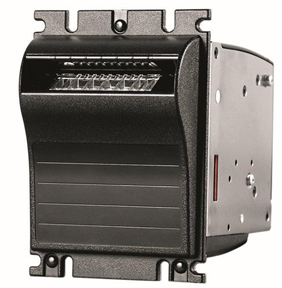
Crane Payment Solutions offers bill and coin validators and recyclers for transportation operations worldwide
By Bassam Estaitieh
Crane Payment Solutions (CPS), Concord, ON, Canada, a vendor of cash payment systems for the global transportation market with offices worldwide, designs and manufactures bill validators and recyclers, coin validators and recyclers as well as coin dispensers with both transit operator benefit and rider experience in mind.
Unlike other fare box manufacturers, CPS does not design the physical fare box. Rather, it provides the cash payment devices inside the fare box to companies such as Genfare for integration into the system to accept bank notes as well coins and tokens.

As customers board the bus, they insert their tokens, coins or bank notes into a fare collection box. The box has the capability to alert the driver if the amount of the inserted fare is correct or incorrect.
CPS also manufactures higher-end recyclers for ticket vending machines (TVMs) that are typically installed at bus stations. The bill-to-bill 300XE bill recycler is showing great success in public transportation worldwide, with both train and bus segments adopting the technology. The CPS bill recycler is soon to be installed in ticket vending machines at bus stations in Abu Dhabi, UAE.
European advantages
CPS enjoys strong ties with the European transit market, one of the most advanced in the world.
Company leaders who operate globally find the U.S. a bit behind some European countries in terms of transportation technology. In regard to cash payment systems, the clear trend in European TVMs is the adoption of bill recycling to help reduce the cost of cash management. CPS is a major player in that segment in Europe, and has the advantage of a well-featured device. The company says it is starting to see the adoption of this technology in the U.S., but it a slower pace than in Europe.
The Crane bill recycler is the device of choice in the recent TVM tender award by Southeastern Pennsylvania Public Transit Authority (SEPTA), Philadelphia, PA. CPS is reporting an uptake of bill recycling in the metro segment, and hoping it will spill over into the bus segment at bus station TVMs.
CPS believes Europe is ahead of the U.S. for a variety of reasons, but mainly its advanced infrastructure and the fact that historically, public transportation has been more popular in Europe, where they have better connected networks of metro, subways and buses. With such a deployed network, the commitment to spending on infrastructure and technology is much greater. The European public is mostly supportive of public transportation being a necessity and something that warrants investment. Higher fuel costs in Europe also drive more people to public transportation.
Tokens could wane
Since the 1990s if not earlier, there have been predictions of cash disappearing. The fact is, it probably won’t happen for a very long time, if it does at all. A 2011 report by the Federal Deposit Insurance Corporation (FDIC) categorizes the number of unbanked and underbanked Americans. The unbanked do not have bank accounts and deal only in cash. While the underbanked have bank accounts, their services are limited and they make fewer visits to bank branches. The report puts the combined unbanked and underbanked population at 28.3 percent of U.S. households.
The number of unbanked households has actually increased since the recent recession. The struggling economy drove more people to cash as they ridded themselves of their credit cards and found their credit limits lowered.
Transit riders are more likely to use cash, especially given the relatively low the fare structure. There is a higher composition of cash-only transit riders than in the general economy overall.
Tokens, on the other hand, may be a novelty that soon wanes in use and popularity. Transit tokens must be minted separately for each individual agency and are difficult to implement and maintain.
There is really no reason to use tokens in agency with a good cash acceptance system. Tokens also provide easy opportunities for cheating. The Federal Reserve goes to extreme measures to ensure that currency includes security features that make it difficult to counterfeit. Tokens usually don’t come with such security features and are easily counterfeited. In addition, transit operators have to go through the pain of managing their own token system, sourcing it and then distributing the tokens. The question becomes: Why incur these additional overhead expenses? BR
Bassam Estaitieh serves with Crane Payment Solutions as product manager for transportation.
